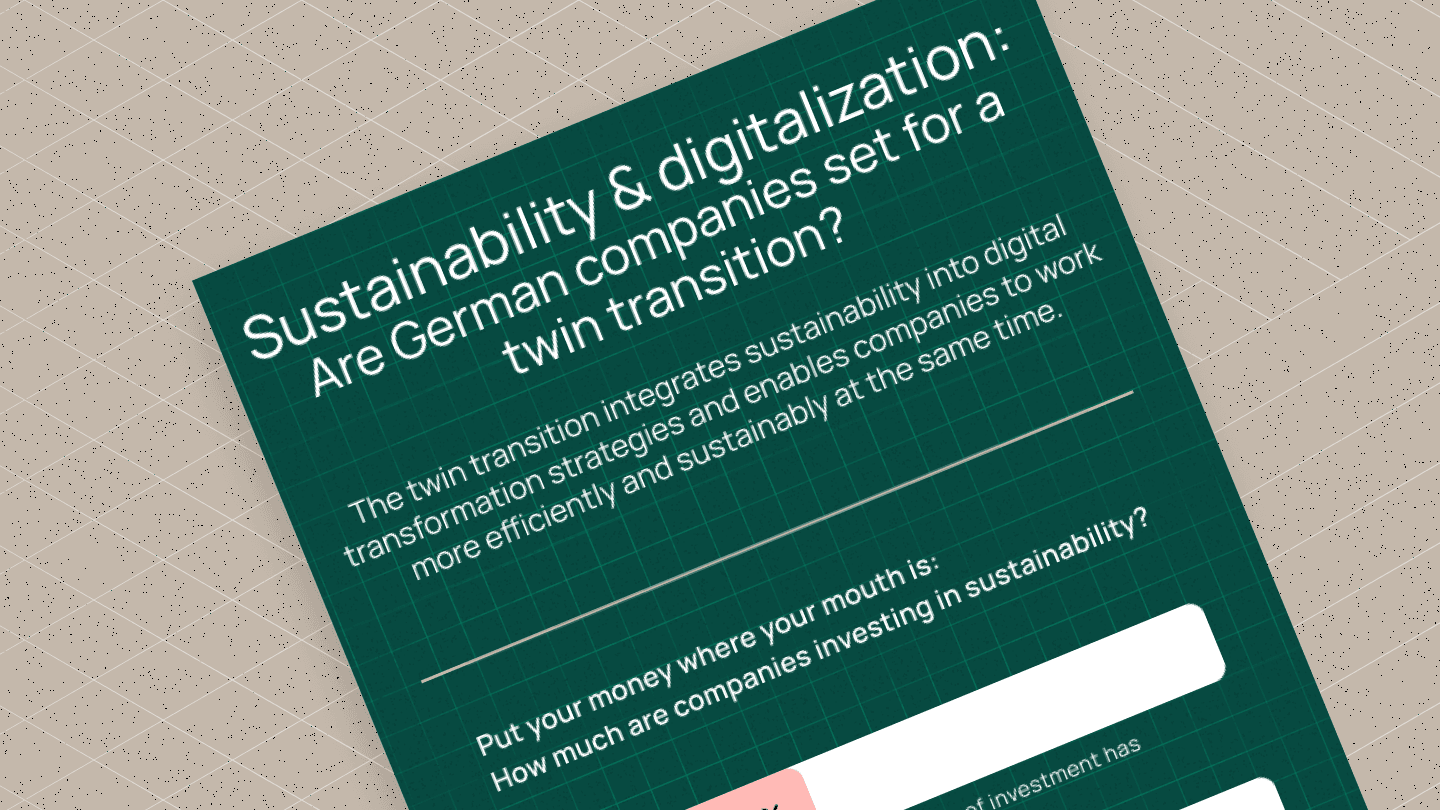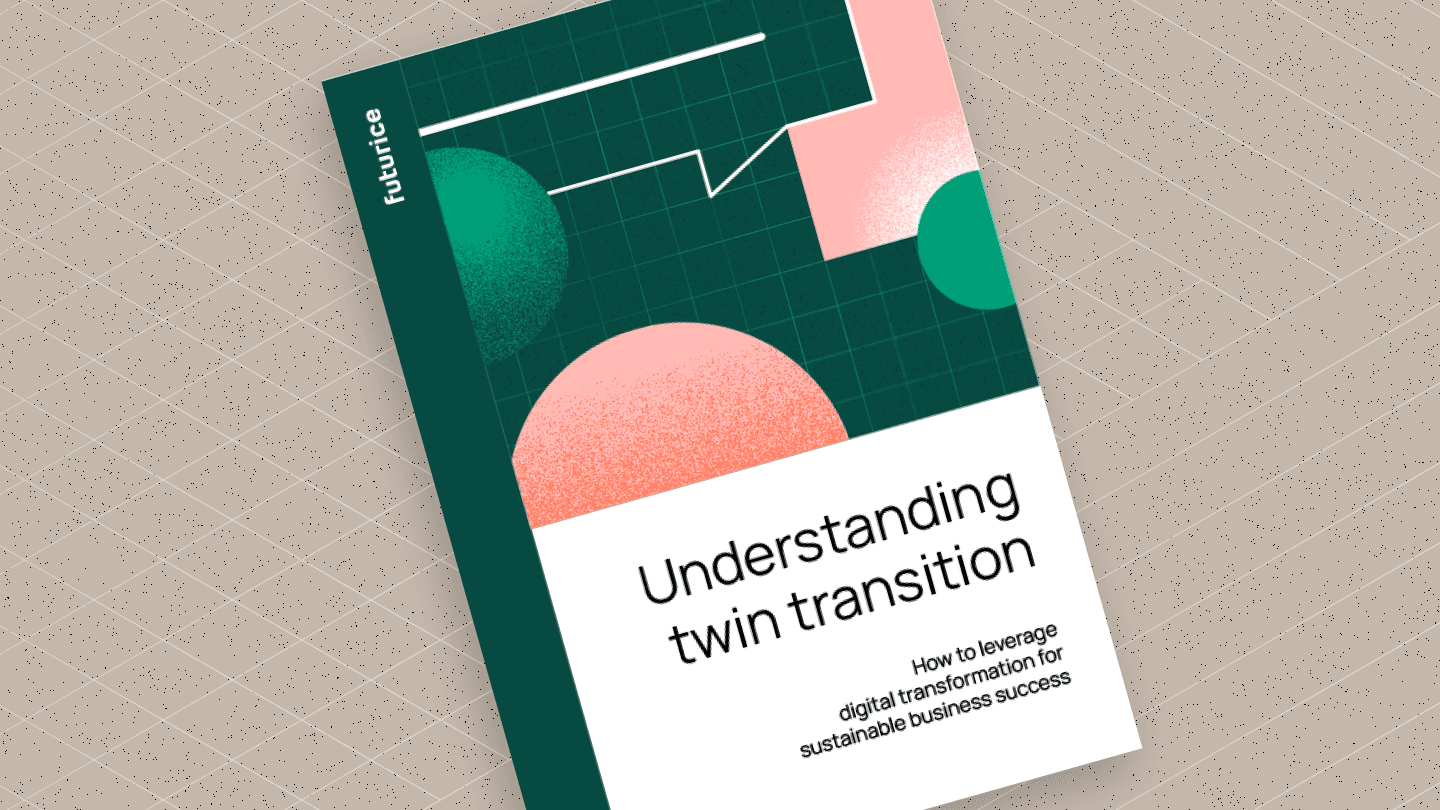Our twin transition survey – impact and actions for German business
Staying ahead in today's fast-paced world means quickly adapting, particularly in areas like digitalization and sustainability that determine future competitiveness. In a recent study we interviewed more than 250 automotive, healthcare, and IT executives about their companies' digital and sustainability strategies. Our findings provide actionable insights for German businesses that are starting the twin transition journey, aligning digital transformation with strategic sustainability goals.

Faced with challenges related to developing their digital capabilities and growing sustainability needs, companies are increasingly choosing to combine their efforts in these two areas. Known as a twin transition, this approach has many benefits – after all, digital solutions can help make operations more efficient and productive while at the same time making the operations and business less wasteful. Twin transition prioritizes the conservation of natural resources and the reduction of waste through a simultaneous low-carbon and circular economy.
If we focus on the German business landscape, what is the impact of twin transition on companies? What are actionable recommendations? In this article, I'll take a closer look at the results of our survey.
Impact on German businesses:
By interpreting the data and drawing upon our knowledge of sustainability and digital transformation, we can identify the top three implications for German businesses:
Financial performance: 18% of the respondents have increased their investments in sustainability. However, 36% have seen a decrease in investments. This highlights the need for businesses to align their financial resources with their sustainability goals. Companies that strategically invest in sustainability can enhance their long-term financial performance, unlock new business models, and mitigate risks associated with climate change and resource scarcity while at the same time highlighting their positive change to society.
Operational efficiency: 30% of respondents recognize the inherent connection between digitalization and sustainability. Companies that embrace digital tools and processes can achieve operational efficiency while simultaneously advancing their sustainability objectives. By integrating digital technologies such as the Internet of Things (IoT), artificial intelligence (AI), and data analytics, German businesses can optimize resource utilization, reduce waste, and enhance their overall environmental performance.
Trends and shifts in business practices: The results suggest a significant shift in business practices: 30% of the leaders say that digitalization and sustainability go hand in hand and 15% are at least considering implementing a joint strategy. This trend highlights the growing recognition of the synergies between sustainability and digital transformation. Businesses that adopt an integrated approach can capitalize on opportunities presented by the twin transition and gain a competitive advantage in the market. For example, Nordic Semiconductor has successfully combined low-power wireless solutions with digitalization to drive innovation and efficiency, gaining a competitive advantage in the market. Their integrated strategy illustrates the power of merging sustainability and digital transformation.
Actionable recommendations:
To help German companies become more sustainable and digital, we propose three actionable recommendations:
Adopt sustainable technologies: Companies should explore and adopt sustainable technologies such as renewable energy systems, energy-efficient equipment, smart grid solutions, and circular economy practices. When implementing digital tools and processes, including IoT, AI, and data analytics, a considerate integration into the current value chain can optimize resource management, reduce prodigality, and enhance overall environmental performance. Large Futurice cloud partners such as Google, Azure and AWS have used its AI and data analytics capabilities to improve resource management and environmental performance. For example, the company has used AI to optimize energy use in its data centers, resulting in a reduction of up to 40% in cooling energy consumption.
Upskill workforce: Businesses should invest in upskilling their workforce to bridge the technological know-how gap. Many companies provide training programs, workshops, and knowledge-sharing platforms so employees can leverage digital tools effectively, develop sustainability-oriented mindsets, and contribute to innovation and problem-solving within the organization. For example, Salesforce uses its training platform to educate employees about setting science-based targets, the U.N. Sustainable Development Goals, and understanding the role corporations can play in reducing their environmental impact.
Collaborate and form partnerships: Companies should collaborate with technology providers, research institutions, and other stakeholders to foster innovation, share best practices, and co-create sustainable solutions. Strategic partnerships can facilitate access to expertise, resources, and funding, enabling businesses to accelerate their digital transformation and sustainability efforts. At the same time, creating production ecosystems, relying on economies of scope , are one of the most efficient ways of reducing spoilage and collaborating to optimize forecasting as well as production.
The survey results underscore the importance of integrating sustainability and digital transformation in German businesses. To thrive in an evolving business landscape, companies must embrace the twin transition, enhance their sustainability efforts, and leverage digital technologies.
Investing in sustainability, upskilling their workforce, and fostering collaboration will help make German businesses more resilient, profitable, and impactful.
Learn more about the value of twin transition
If you’d like to dive a bit deeper into the topic of twin transition in general, I strongly encourage you to check out our recent publications, Understanding twin transition and The change leader's guide to sustainable growth.
The topic can be complex, and getting started is not necessarily easy, but we guarantee the benefits are worth the effort. If you want to explore what the twin transition could mean for your company, please get in touch. We are happy to support you on your journey to a more sustainable, secure, and successful future.
See all of our Digital Transformation services here
 Yannick EngelGlobal Product Director
Yannick EngelGlobal Product Director


